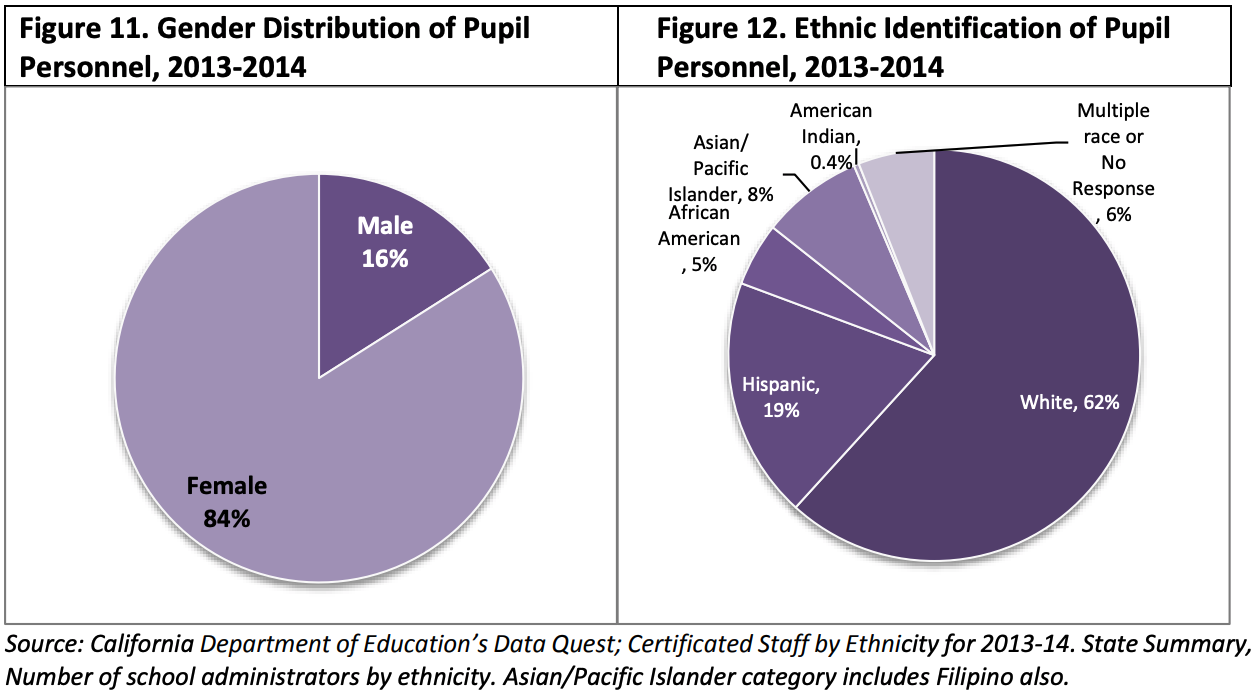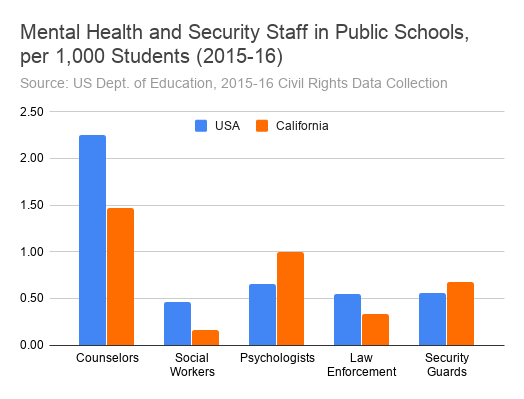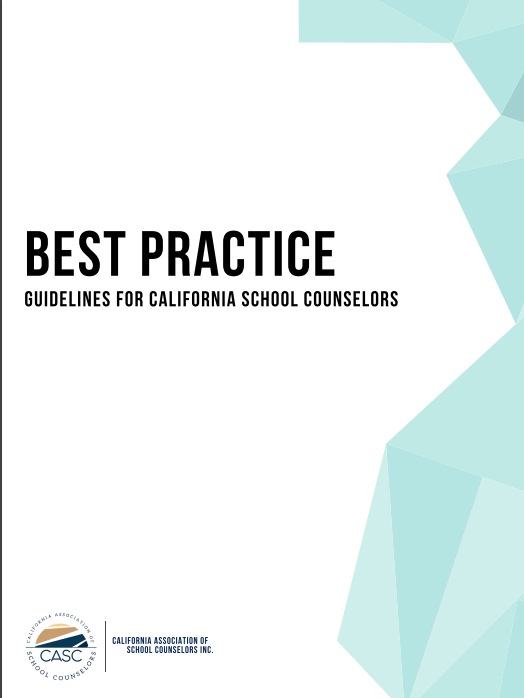What Do School Counselors Do?

The Role of the School Counselor
Sometimes things don't go like they should.
In This Lesson
What are Pupil Services?
How many counselors in California?
Are there more administrators than counselors?
Do elementary schools have counselors?
What are the qualifications of a school counselor?
What are the qualifications of a school psychologist?
What are the qualifications of a school social worker?
Are counselors certified?
What are best practices for counselors?
How are counselors involved in school attendance?
What is a SARB?
What do guidance counselors do?
Do counselors work for the principal?
What is a counselor's role in school discipline?
Are most school counselors women?
What is a School Resource Officer?
Who pays for police officers in schools?
Can school policing funds be used for counseling?
When bad stuff happens, kids need help — and it can be beyond the capacity or availability of teachers to provide what students need. Trauma, or a mental health crisis, or family distress, or a million other things can torpedo a student's performance in school… unless they get the right help.
School counselors are trained and equipped to provide students with help that teachers generally cannot.
Along with social workers and school psychologists, counselors are part of what schools call pupil services. It's a catchall term meant to include the highly educated professionals who are equipped to help students deal with health, safety and academic issues.
"Resource Officers" are school police officers
Confusingly, school "resource officers" aren't counselors or pupil services faculty — they are police officers.
This post breaks it down.
How Many Counselors in California?
Counselors and other school pupil services staff are employed by school districts. The state does not dictate how many of these professionals each school district should hire — that is a matter of local control. Overall, California consistently has long had one of the worst student-to-counselor ratios in the nation, but the ratios vary a lot from one school district to the next. The National Association of School Counselors recommends one school counselor per 250 students; in California the 2018 average was one per 594 students.
The total number of pupil services professionals in the state is similar to the number of principals and other administrators, but whereas every school has administrators the same cannot be said for counselors. Many California elementary schools make do without any counselors at all.
The state's last survey of pupil services faculty was conducted in 2003. It found that virtually all middle schools and high schools have some kind of counseling services, but only half of elementary schools do.
What Are the Qualifications of a School Counselor?
The definition of a school counselor in California is a little circular: a counselor is a college graduate who has a credential in pupil services with a specialty in school counseling. This credential requires a bachelor's degree plus about three years' worth (48 semester units) of postgraduate education at a college authorized by the California Commission on Teacher Credentialing (CTC). In 2019, there were 33 institutions of higher education in California with this authorization. The majority of school counselors in California earn their credential from a private college in the state; just over a third earn it from a college in the California State University (CSU) System.
Many counselors in California earn their undergraduate degree in psychology, but this isn't a requirement. In practice, most counselors hold at least a master's degree. Although some counselors transition into the profession from a career in teaching, most school counselors in California start as school counselors.
The California Association of School Counselors (CASC), in its useful brief Best Practice Guidelines for California School Counselors (PDF), describes counselors as "the first school-based mental health professionals to interact with students when they are struggling." The California Education Code describes the work of counselors quite broadly, but requires school districts to be more specific. If a district hires counselors, the school board is supposed to adopt a local policy to define the scope of their responsibilities.
If your district has adopted such a policy, it might have used the template suggested by the California School Boards Association (CSBA). You might find it on your district's website or on CSBA's Gamut Online service by searching for board policy 6164.2. (example) Tip: If the policy mentions the California High School Exit Exam, it's out of date. The exit exam isn't a thing anymore.
In many schools, job #1 for school counselors is to help ensure that kids show up to school. Attendance is measurable, it matters, and it's personal. When kids miss school, something is wrong, but what? The nature of the challenge can vary from one family to the next, and school counselors can help figure out ways to help.
Every school district in California is supposed to appoint someone as supervisor of attendance, a role that can be filled by an administrator or a counselor. Improving attendance is sufficiently important that the state has created a 9 semester-unit add-on credential to help counselors and other pupil service staff focus on it effectively. To earn the credential, candidates must do field work outside the context of education, for example by working with law enforcement, juvenile justice, child health and welfare, mental health, social services, child protective services or community based organizations. Pupil Service staff that earn this credential are well-qualified to serve on a School Attendance Review Board (SARB), and can coordinate services with law enforcement and social service organizations to promote and enforce school attendance.
Attendance is just a baseline concern for counselors, of course. The mental health and learning needs of each student is individual and unique. Not all students need or receive the same level of counseling services — some need more and others less. Counselors are asked to wear a lot of hats, from helping students learn to manage their emotions to academic and career advising. One of the hardest parts of the job is allocating time among many competing demands.
School Counselors need opportunities to learn from one another.
Because school counselors are scarce, it is pretty easy for them to feel isolated and overwhelmed in their work. Counselors need opportunities to meet and learn from one another. The California Association of School Counselors is a good resource for ongoing training and connection for counselors, and it arranges useful events and conferences. The national association (ASCA) offers additional tools including online learning resources.
Some Counseling Needs Differ with Age
Most elementary-grade students in California don't have access to a school counselor. In schools that have them, counselors may play a role in developing and implementing curriculum related to social-emotional learning.
School districts are significantly more likely to hire counselors to support students in middle and high school grades. Among other roles, counselors can play a vital role in training students and teachers to de-escalate and resolve conflict. (For more about the many roles school counselors play, consider a deep dive into the rather exhaustive ASCA national model.)
In days of yore, many school districts employed "guidance counselors" or "college counselors" to personally advise and support students as they navigated toward life after graduation. This job function for counselors hasn't disappeared, but it has become rare. California's public colleges and universities no longer require a counselor recommendation as part of the application process, for example. In most high schools, scarce counseling resources tend to be focused on keeping students in school through graduation. To support college-bound students, some school districts work with nonprofit organizations like Avid or CollegeTrack.
What are the Qualifications and Duties of a School Psychologist?
To become a school psychologist requires even more postgraduate study than to become a school counselor: about four years of post-graduate work (60 semester units).
Among other responsibilities, school psychologists play an important role in special education. They are trained to identify students' special learning needs, differences and deficits, and recommend appropriate choices for parents, teachers and administrators. School psychologists are trained in ways to conduct or coordinate psychological assessments, and can play a key role in helping teachers develop relevant accommodations or individualized education programs (IEPs) that enable students to flourish despite their challenges. School psychologists cannot prescribe or administer medications, but they are generally familiar with them.
What are the Qualifications and Duties of a School Social Worker?
It is very hard for students to learn if their basic needs are unmet. Social workers connect students with resources that can change their lives. School Social Workers are rare in California schools, but increasing numbers of districts are hiring them. As of 2019 the CTC recognized programs at 11 colleges and universities leading to credentials for school social workers. The certification requires about 3 years of postgraduate work (45 semester units).
Learn about San Francisco Unified's innovative mental health internship program in Carol's interview for KALW.
Homelessness is a massive challenge in California schools. School social workers aren't equipped with magic wands, but they can help families learn about resources they might not otherwise know about.
Who Do Counselors Work For?
In most schools, pupil services staff are simply overseen by the school principal. Only the largest school districts have enough organizational complexity to place them in a reporting structure.
What's the School Counselor's Role in School Discipline?
Counselors aren't the "bad cop."
School counselors, psychologists and social workers have a clear primary role in school discipline: prevention. To be effective in their work, these professionals need students to trust them, and that requires a relationship that is honest but positive. When students get involved in conflict or find themselves on the verge of academic ruin, counselors aren't the "bad cop."
Who Becomes a Counselor?
Most school counselors, psychologists and social workers in California are white women. This is the case throughout America. People working in these fields are typically in their thirties and forties.

What's the Role of a School Resource Officer?
A school resource officer is a police officer, usually armed, who is posted to work in or near a school or school district. Some schools have hired security guards for a long time, but public demand for sworn officers in schools increased significantly as a response to mass shootings in schools.
School Resource Officers are police officers.
Both school counselors and school resource officers are intended to contribute to the safety of the school environment, but in very different ways. In 2019 the American Civil Liberties Union (ACLU) gathered research about the intended and unintended effects of increased police presence in schools. The data, unsurprisingly, show that when police officers are placed in schools, students are suspended, arrested and prosecuted at higher rates. Among other findings, the ACLU report highlighted a troubling reality: 390,000 students in California in 2016 attended a school with a police officer but no counselor.

Police officers aren't like other staff in schools for many reasons, including the fact that school faculty are usually women and police officers are usually men.
Should School Policing Dollars Be Reallocated to Counseling?
Partly in response to the ACLU report, there have been increasing calls to reallocate resources "from cops to counselors" Putting this into practice involves some organizational obstacles worth understanding: even when posted to a school, police aren't part of the school system.
Cities and school districts are entirely separate government entities with separate missions, separate budgets and separate authority. This separation reflects different priorities, and can lead to confusion about authority without thoughtful coordination.
|
Organizationally Separate: Police and Counselors |
|
|---|---|
Police (including school resource officers) are part of the city budget, not the school district budget. |
Counselors and other school staff (including non-police security guards) are part of the school district budget, not the city budget. |
Police are overseen by municipal authorities, and ultimately by a city administrator appointed by a city council. |
Counselors are overseen by school administration and ultimately by a school superintendent hired by a school board. |
Because police and counselors are organized and funded separately, calls to reallocate resources "from cops to counselors" involves more head-scratching complexity than many advocates realize. Even the geography of responsibility can be challenging: school districts and municipal boundaries sometimes match, but often don't.
Tags on this post
At-risk students Attendance Character Education College School Climate Career CounselorsAll Tags
A-G requirements Absences Accountability Accreditation Achievement gap Administrators After school Algebra API Arts Assessment At-risk students Attendance Beacon links Bilingual education Bonds Brain Brown Act Budgets Bullying Burbank Business Career Carol Dweck Categorical funds Catholic schools Certification CHAMP Change Character Education Chart Charter schools Civics Class size CMOs Collective bargaining College Common core Community schools Contest Continuous Improvement Cost of education Counselors Creativity Crossword CSBA CTA Dashboard Data Dialogue District boundaries Districts Diversity Drawing DREAM Act Dyslexia EACH Early childhood Economic growth EdPrezi EdSource EdTech Education foundations Effort Election English learners Equity ESSA Ethnic studies Ethnic studies Evaluation rubric Expanded Learning Facilities Fake News Federal Federal policy Funding Gifted Graduation rates Grit Health Help Wanted History Home schools Homeless students Homework Hours of opportunity Humanities Independence Day Indignation Infrastructure Initiatives International Jargon Khan Academy Kindergarten LCAP LCFF Leaderboard Leadership Learning Litigation Lobbyists Local control Local funding Local governance Lottery Magnet schools Map Math Media Mental Health Mindfulness Mindset Myth Myths NAEP National comparisons NCLB Nutrition Pandemic Parcel taxes Parent Engagement Parent Leader Guide Parents peanut butter Pedagogy Pensions personalized Philanthropy PISA Planning Policy Politics population Poverty Preschool Prezi Private schools Prize Project-based learning Prop 13 Prop 98 Property taxes PTA Purpose of education puzzle Quality Race Rating Schools Reading Recruiting teachers Reform Religious education Religious schools Research Retaining teachers Rigor School board School choice School Climate School Closures Science Serrano vs Priest Sex Ed Site Map Sleep Social-emotional learning Song Special ed Spending SPSA Standards Strike STRS Student motivation Student voice Success Suicide Summer Superintendent Suspensions Talent Taxes Teacher pay Teacher shortage Teachers Technology Technology in education Template Test scores Tests Time in school Time on task Trump Undocumented Unions Universal education Vaccination Values Vaping Video Volunteering Volunteers Vote Vouchers Winners Year in ReviewSharing is caring!
Password Reset
Search all lesson and blog content here.
Login with Email
We will send your Login Link to your email
address. Click on the link and you will be
logged into Ed100. No more passwords to
remember!















Questions & Comments
To comment or reply, please sign in .